Reflection on English teaching对英语教学的反思
- 格式:doc
- 大小:27.00 KB
- 文档页数:1
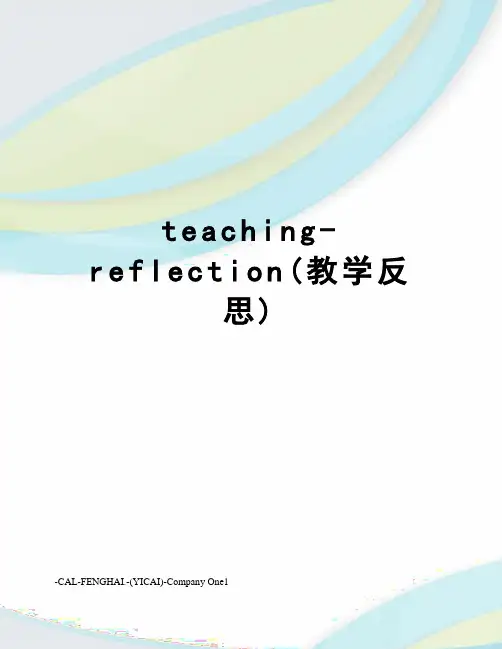
t e a c h i n g-r e f l e c t i o n(教学反思)-CAL-FENGHAI.-(YICAI)-Company One1Teaching reflectionRecently, I presented a few lectures to the students of ** College. What I have learnt fromthe practice of teaching is of great variety. At this moment, after a lecture of English teaching, I cannot help but to reflect on my experience.First of all, my beloved students range fromthe first year students to junior ones, from the specialty of statistics to English teaching. That is to say, it is necessary for me to employ different teaching methods in that the background information of them is of great difference. It is rather challenging for me to appeal to theinterests of all the students. But, from my point of view, I have already tried my best to mobilize them to be involved into the progress of learning. Just as what the Silent Way holds, tell me and I forget; teach me and I remember; involve me and I learn.As for the students of statistics, I mainly use the traditional grammar-translation approach to teach the college English, partly because theyare the freshmen and it is not a wise choice to impel them to reason some thought-provoking statements. Why is it not a wise choiceOne day, one guy asked me for the answers of the exercises at the end of the unit. He reminded me that almost all of them are still slaved by the exam-oriented education. The English class in their mind is that the teacher should go through the text and the exercises words by words, sentences by sentences, translate the text, and show the answers to the followed questions. In order to make them feel at home, I would better explain the text in detail, but this is not what the higher education aims at. The national new English curriculum stipulate that there are five objectives which are expected to achieved at the end of the lesson, and language knowledge and language skills are merely two of them, the rest of which are affection, learning strategies, and cultural awareness. The rest three components, however, is more vital than the first two, for the students I am teaching are college students,rather than middle school student, whose majorjob is to lay a solid foundation for the future development. Therefore, I used some open-questions, hoping to change their attitudetowards the college English class, which nolonger focuses on the language contents andskills alone, but on some other more significant stuff, for instance, reasoning, arguing, debating, etc. I clearly remember the text named “why dowe believe that the earth is round?”, written by George Orwell, a well-known novelist and critic.In that article, the author advanced that we are living in a gullible, credulous, andsuperstitious age. The ideas we hold does notrest on reasoning or experiment, but on authority. People take it for granted that what have been proved to be true is true, they never questionthe truth. What a thought-provoking words.As for the English majors, I naively supposedthat since they are English advanced learner it would be easy for them to accept the task-based language teaching model, in which I encouragedthem to perform tasks, show the fruit of their discussions, and, most importantly, explain why they think in that way and argue with the rest of the classmates if they share different ideas. Unfortunately, it turned out that I was wrong. They don’t give it a shit! But, what are the reasons behind this distressing matterHere comes the second problem.Who is responsible for the status quo that the students have little interests in the college English class, the teachers, the students or the schoolsAs a teacher, whose major task is to cultivate the students, cannot escape from this responsibility. Of course, the low motivation of the students and the contents of the teaching materials may also result in this phenomenon, but this is not the key point of this reflection. Something might well go wrong in the teachers. Since the beginning of education, how to stimulate the students’ interests and motive them to study has been a heated topic, especiallyin modern education, in which a revolution has taken place to cultivate the student’s communicative competences, reasoning awareness, and cooperative spirit. Although I have read alot of literatures and books about how to get the students motivated, it is still a tough nut to crack. And here comes the 3rd problem, which is how to mobilize the students.Socrates and Confucius are experts in utilizing heuristics to induce their students to reason. When the students do not know what to speak, how to start a task, it is always helpful to offer a hint, but just a hint. Do not dominate the talk!A sound lesson plan plays a crucial role in presenting a successful lesson. It is pretty easy for the students to tell whether his teacher has prepared the lesson or not, to what extent and on what level. Therefore, how dare you long for an ideal lesson if you do not take it seriously? What’s more, the lesson plan gives the teacher a sound command of the lesson so that the lesson can run smoothly from one stage to another,otherwise, chaos and the loss of control might arise in the class, which hurt students’ zealand embarrass the teacher. As far as lesson planis considered, we should bear in mind that the teacher ought to be careful not to be the slaveof the lesson plan, for the real classroom isfull of unexpected events, it is dynamic rather than static.It is safe to say that when the students hold various opinions they are more eager to communicate with each other. That is to say, in order to arouse their urge to engage in the taskor activity, the teacher should lure the students to think in other ways, or even from the opposite position. It is during the fierce arguing and debating that the students digest the knowledge best. Because an implicit premise of arguing isthat they have to firstly figure out the argument, which usually involves the main content of the lesson, otherwise, they will be easy to be refuted, to which most of the students do notlook forward while they are performing the task.I hold the view that teaching is a matter of creative process, and the reward, both material and spiritual, eventually you get will justify your time and endeavor.。
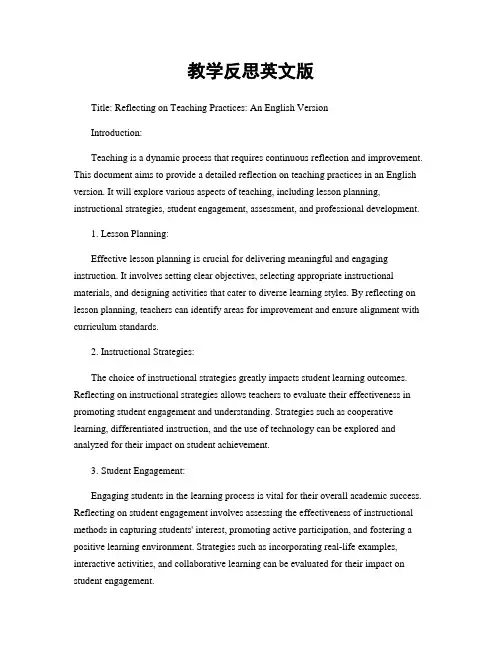
教学反思英文版Title: Reflecting on Teaching Practices: An English VersionIntroduction:Teaching is a dynamic process that requires continuous reflection and improvement. This document aims to provide a detailed reflection on teaching practices in an English version. It will explore various aspects of teaching, including lesson planning, instructional strategies, student engagement, assessment, and professional development.1. Lesson Planning:Effective lesson planning is crucial for delivering meaningful and engaging instruction. It involves setting clear objectives, selecting appropriate instructional materials, and designing activities that cater to diverse learning styles. By reflecting on lesson planning, teachers can identify areas for improvement and ensure alignment with curriculum standards.2. Instructional Strategies:The choice of instructional strategies greatly impacts student learning outcomes. Reflecting on instructional strategies allows teachers to evaluate their effectiveness in promoting student engagement and understanding. Strategies such as cooperative learning, differentiated instruction, and the use of technology can be explored and analyzed for their impact on student achievement.3. Student Engagement:Engaging students in the learning process is vital for their overall academic success. Reflecting on student engagement involves assessing the effectiveness of instructional methods in capturing students' interest, promoting active participation, and fostering a positive learning environment. Strategies such as incorporating real-life examples, interactive activities, and collaborative learning can be evaluated for their impact on student engagement.4. Assessment:Assessment plays a critical role in monitoring student progress and guiding instructional decisions. Reflecting on assessment practices allows teachers to evaluate the validity, reliability, and fairness of their assessment methods. Different types of assessments, such as formative and summative assessments, can be analyzed for their effectiveness in measuring student learning and providing valuable feedback.5. Professional Development:Continuous professional development is essential for teachers to stay updated with the latest research and best practices in education. Reflecting on professional development experiences allows teachers to assess their impact on instructional practices. Attending workshops, conferences, and participating in collaborative professional learning communities can be evaluated for their contribution to teacher growth and student achievement.Conclusion:Reflecting on teaching practices is a valuable process that allows educators to enhance their instructional methods, improve student engagement, and promote continuous professional development. By analyzing lesson planning, instructional strategies, student engagement, assessment practices, and professional development experiences, teachers can make informed decisions to optimize their teaching effectiveness. Continuous reflection and improvement are essential for creating a positive and impactful learning environment for students.Note: The above content is a sample reflection on teaching practices in an English version. The information and data provided are fictional and should not be considered as real-world examples.。
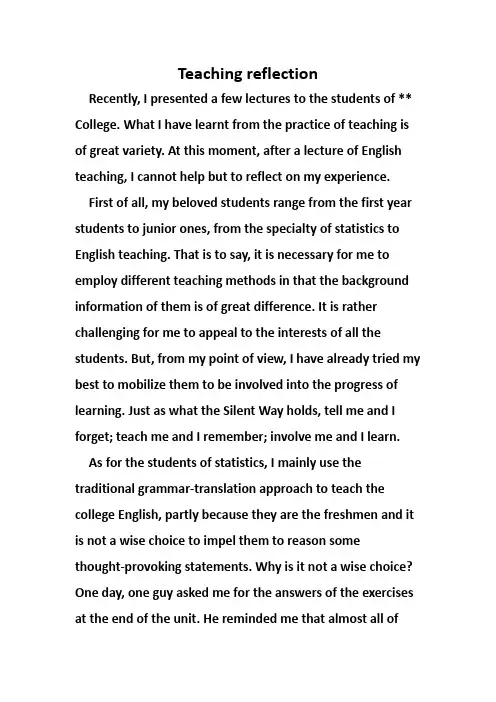
Teaching reflectionRecently, I presented a few lectures to the students of ** College. What I have learnt from the practice of teaching is of great variety. At this moment, after a lecture of English teaching, I cannot help but to reflect on my experience. First of all, my beloved students range from the first year students to junior ones, from the specialty of statistics to English teaching. That is to say, it is necessary for me to employ different teaching methods in that the background information of them is of great difference. It is rather challenging for me to appeal to the interests of all the students. But, from my point of view, I have already tried my best to mobilize them to be involved into the progress of learning. Just as what the Silent Way holds, tell me and I forget; teach me and I remember; involve me and I learn. As for the students of statistics, I mainly use the traditional grammar-translation approach to teach the college English, partly because they are the freshmen and it is not a wise choice to impel them to reason somethought-provoking statements. Why is it not a wise choice? One day, one guy asked me for the answers of the exercises at the end of the unit. He reminded me that almost all ofthem are still slaved by the exam-oriented education. The English class in their mind is that the teacher should go through the text and the exercises words by words, sentences by sentences, translate the text, and show the answers to the followed questions. In order to make them feel at home, I would better explain the text in detail, but this is not what the higher education aims at. The national new English curriculum stipulate that there are five objectives which are expected to achieved at the end of the lesson, and language knowledge and language skills are merely two of them, the rest of which are affection, learning strategies, and cultural awareness. The rest three components, however, is more vital than the first two, for the students I am teaching are college students, rather than middle school student, whose major job is to lay a solid foundation for the future development. Therefore, I used some open-questions, hoping to change their attitude towards the college English class, which no longer focuses on the language contents and skills alone, but on some other more significant stuff, for instance, reasoning, arguing, debating, etc. I clearly remember the text named “why do we believe that the earth is round?”, written by GeorgeOrwell, a well-known novelist and critic. In that article, the author advanced that we are living in a gullible, credulous, and superstitious age. The ideas we hold does not rest on reasoning or experiment, but on authority. People take it for granted that what have been proved to be true is true, they never question the truth. What a thought-provoking words. As for the English majors, I naively supposed that since they are English advanced learner it would be easy for them to accept the task-based language teaching model, in which I encouraged them to perform tasks, show the fruit of their discussions, and, most importantly, explain why they think in that way and argue with the rest of the classmates if they share different ideas. Unfortunately, it turned out that I was wrong. They don’t give it a shit! But, what are the reasons behind this distressing matter? Here comes the second problem.Who is responsible for the status quo that the students have little interests in the college English class, the teachers, the students or the schools? As a teacher, whose major task is to cultivate the students, cannot escape from this responsibility. Of course, the low motivation of the students and the contents of the teaching materials may also result inthis phenomenon, but this is not the key point of this reflection. Something might well go wrong in the teachers. Since the beginning of education, how to stimulate the students’ interests and motive them to study has been a heated topic, especially in modern education, in which a revolution has taken place to cultivate the student’s communicative competences, reasoning awareness, and cooperative spirit. Although I have read a lot of literatures and books about how to get the students motivated, it is still a tough nut to crack. And here comes the 3rd problem, which is how to mobilize the students.Socrates and Confucius are experts in utilizing heuristics to induce their students to reason. When the students do not know what to speak, how to start a task, it is always helpful to offer a hint, but just a hint. Do not dominate the talk!A sound lesson plan plays a crucial role in presenting a successful lesson. It is pretty easy for the students to tell whether his teacher has prepared the lesson or not, to what extent and on what level. Therefore, how dare you long for an ideal lesson if you do not take it seriously? What’s more, the lesson plan gives the teacher a sound command of thelesson so that the lesson can run smoothly from one stage to another, otherwise, chaos and the loss of control might arise in the class, which hurt students’ zeal and embarrass the teacher. As far as lesson plan is considered, we should bear in mind that the teacher ought to be careful not to be the slave of the lesson plan, for the real classroom is full of unexpected events, it is dynamic rather than static.It is safe to say that when the students hold various opinions they are more eager to communicate with each other. That is to say, in order to arouse their urge to engage in the task or activity, the teacher should lure the students to think in other ways, or even from the opposite position. It is during the fierce arguing and debating that the students digest the knowledge best. Because an implicit premise of arguing is that they have to firstly figure out the argument, which usually involves the main content of the lesson, otherwise, they will be easy to be refuted, to which most of the students do not look forward while they are performing the task.I hold the view that teaching is a matter of creative process, and the reward, both material and spiritual, eventually you get will justify your time and endeavor.。
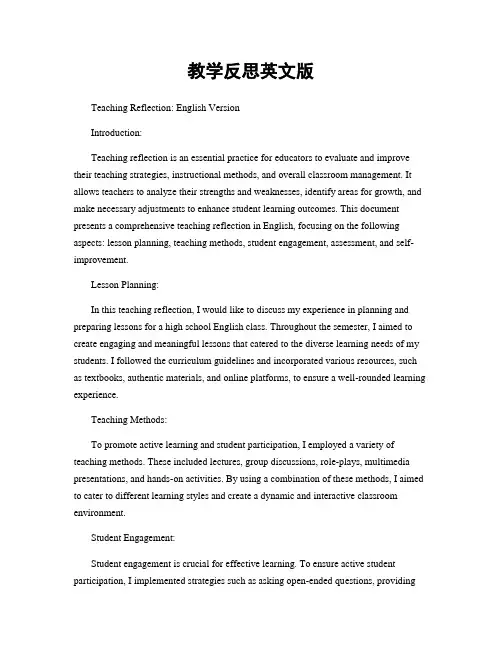
教学反思英文版Teaching Reflection: English VersionIntroduction:Teaching reflection is an essential practice for educators to evaluate and improve their teaching strategies, instructional methods, and overall classroom management. It allows teachers to analyze their strengths and weaknesses, identify areas for growth, and make necessary adjustments to enhance student learning outcomes. This document presents a comprehensive teaching reflection in English, focusing on the following aspects: lesson planning, teaching methods, student engagement, assessment, and self-improvement.Lesson Planning:In this teaching reflection, I would like to discuss my experience in planning and preparing lessons for a high school English class. Throughout the semester, I aimed to create engaging and meaningful lessons that catered to the diverse learning needs of my students. I followed the curriculum guidelines and incorporated various resources, such as textbooks, authentic materials, and online platforms, to ensure a well-rounded learning experience.Teaching Methods:To promote active learning and student participation, I employed a variety of teaching methods. These included lectures, group discussions, role-plays, multimedia presentations, and hands-on activities. By using a combination of these methods, I aimed to cater to different learning styles and create a dynamic and interactive classroom environment.Student Engagement:Student engagement is crucial for effective learning. To ensure active student participation, I implemented strategies such as asking open-ended questions, providingopportunities for peer collaboration, and incorporating real-life examples. I also encouraged students to share their thoughts and opinions, fostering a supportive and inclusive classroom culture. Additionally, I regularly assessed student understanding through formative assessments, allowing me to gauge their progress and provide timely feedback.Assessment:Assessment is an integral part of the teaching and learning process. Throughout the semester, I employed various assessment techniques to evaluate student performance and understanding. These included quizzes, tests, presentations, projects, and class participation. By using a combination of formative and summative assessments, I was able to gather comprehensive data on student progress and adjust my teaching accordingly.Self-Improvement:As an educator, I believe in continuous professional development. To enhance my teaching skills, I actively sought feedback from colleagues, attended workshops and conferences, and engaged in self-reflection. I regularly evaluated my teaching practices and sought innovative strategies to meet the evolving needs of my students. By reflecting on my teaching methods and seeking opportunities for growth, I aimed to provide the best possible learning experience for my students.Conclusion:In conclusion, this teaching reflection in English highlights my experience and growth as an educator. Through effective lesson planning, diverse teaching methods, student engagement strategies, comprehensive assessment techniques, and a commitment to self-improvement, I aimed to create a positive and engaging learning environment. By critically reflecting on my teaching practices, I can continue to refine my skills and provide quality education to my students.。
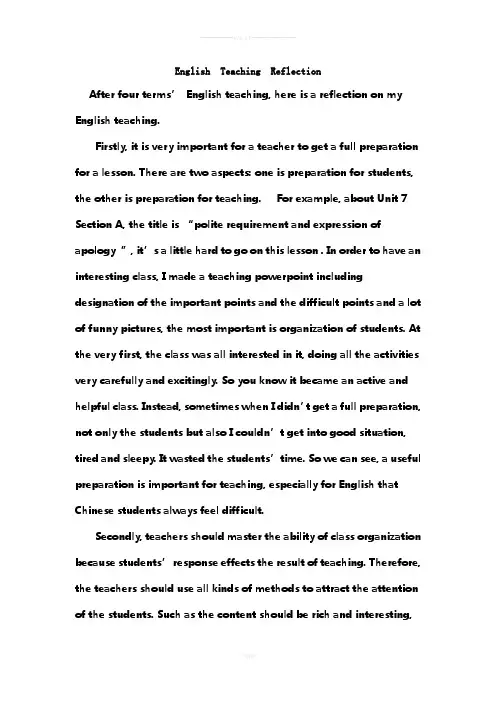
English Teaching ReflectionAfter four terms’English teaching, here is a reflection on my English teaching.Firstly, it is very important for a teacher to get a full preparation for a lesson. There are two aspects: one is preparation for students, the other is preparation for teaching. For example, about Unit 7 Section A, the title is “polite requirement and expression of apology ”, it’s a little hard to go on this lesson . In order to have an interesting class, I made a teaching powerpoint including designation of the important points and the difficult points and a lot of funny pictures, the most important is organization of students. At the very first, the class was all interested in it, doing all the activities very carefully and excitingly. So you know it became an active and helpful class. Instead, sometimes when I didn’t get a full preparation, not only the students but also I couldn’t get into good situation, tired and sleepy. It wasted the students’time. So we can see, a useful preparation is important for teaching, especially for English that Chinese students always feel difficult.Secondly, teachers should master the ability of class organization because students’response effects the result of teaching. Therefore, the teachers should use all kinds of methods to attract the attention of the students. Such as the content should be rich and interesting,but not too easy or not too difficult, and the procession should be natural. Thus the students can learn English at a very natural situation. For a teacher, he or she should be energetic every day. Coming back to my teaching, I feel a little upset for I can’t deal with my emotion better. When some students break the class rule, I suddently get so angry and the situation go on a long time that the lesson can’t be wonderful, or I should say it is pretty bad. From now on, getting over it becomes my emergency.Thirdly, students’interest should be aroused. About this point, one is helping students get an English name; one is talking about British and American culture and telling stories as much as possible; another is helping some students make penfriends with students in America. In these ways, students love English better, love learning English better, especially improve their English including writing ability.Fourthly, English is a kind of language. students need to reading more, speaking more, practice more except learning on class. The first: every morning----students’practice time, I go around the class, finding the students’problems, helping students find out the answer to the problem. The second: after class, I check every students’homework and help students find out the mistakes and correct them. The third, I also ask several students who are not veryinterested in English to recite the text to improve them.Fifthly, after the Mid-term exam and Final exam, i found two disadvantages: one is that there are many expecting-improving students, I plan to spend enough time in leading them to learn English, one is that the analysis ability of the students need to improve. In future, I must think over much more ways to do with the problem.The five points above are my teaching reflection. Now, I must improve myself, improve my students’English. Thanking for your guidance.10月14日reflection on the teachingI usually spend long time--- I should say----looking up in the dictionary and surfing on net for as much and complete information as I can, in order to enrich the class. But it appears that most of the time it is just for fun, and contributes little to the improvement, and even the motivation and enthusiasm, if there is any.However, I would be very nervous if I fail to make full preparation for the class, at least good enough in my view. And my textbook is underlined and marked here and there, which makes the other teacher who is in charge of the parellel class surprised. I knowalthough I can manage to give a three-hour class after a fashion, I would have a sense of guilty...Anyway, I have to learn to balance and budge the time, and grasp what is the most important!By the way, to communicate with others and sharing the experience is very important!。
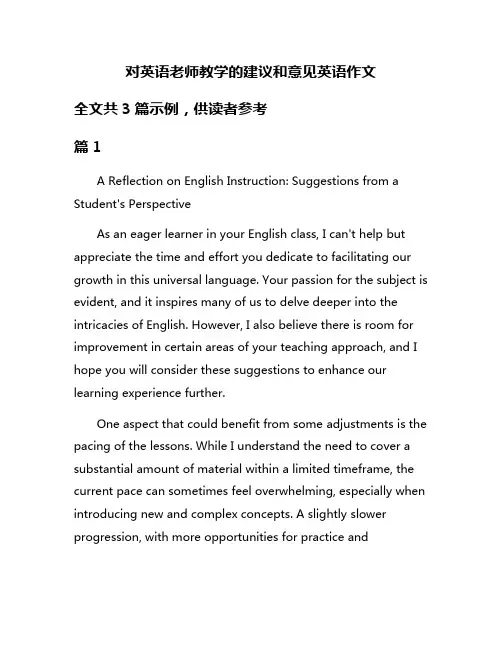
对英语老师教学的建议和意见英语作文全文共3篇示例,供读者参考篇1A Reflection on English Instruction: Suggestions from a Student's PerspectiveAs an eager learner in your English class, I can't help but appreciate the time and effort you dedicate to facilitating our growth in this universal language. Your passion for the subject is evident, and it inspires many of us to delve deeper into the intricacies of English. However, I also believe there is room for improvement in certain areas of your teaching approach, and I hope you will consider these suggestions to enhance our learning experience further.One aspect that could benefit from some adjustments is the pacing of the lessons. While I understand the need to cover a substantial amount of material within a limited timeframe, the current pace can sometimes feel overwhelming, especially when introducing new and complex concepts. A slightly slower progression, with more opportunities for practice andreinforcement, could help solidify our understanding before moving on to the next topic.Additionally, it would be beneficial to incorporate a greater variety of interactive activities and multimedia resources into the lessons. While the traditional lecture format can be effective for conveying information, it may not always cater to different learning styles. By incorporating more hands-on exercises, group discussions, audio-visual aids, and even occasional field trips or guest speakers, you could not only make the material more engaging but also cater to diverse learning preferences.Another area for potential improvement lies in the feedback and assessment methods. While we appreciate the written comments and grades provided on our assignments, more frequent and detailed verbal feedback during class could be invaluable. This would allow us to address any gaps in our understanding promptly and make necessary adjustments before they become ingrained habits. Furthermore, incorporating more formative assessments, such as quizzes or low-stakes writing exercises, could help us gauge our progress and identify areas that require further attention.Regarding the curriculum itself, I would suggest exploring opportunities to tailor the content to our specific interests andgoals whenever possible. While adhering to the prescribed syllabus is essential, incorporating real-world examples, current events, and topics that resonate with our personal and professional aspirations could make the lessons more relevant and engaging. This could involve inviting guest speakers from various fields or even encouraging student-led discussions on subjects that pique our curiosity.Moreover, as we live in an increasingly globalized world, it would be advantageous to incorporate more cross-cultural elements into the lessons. Exploring the nuances of English usage across different regions and contexts, as well as examining the interplay between language and culture, could broaden our perspectives and enhance our ability to communicate effectively in diverse settings.In terms of classroom management, fostering a more inclusive and supportive environment could be beneficial. Encouraging open dialogue, respectful disagreement, and active participation from all students could create a space where we feel comfortable expressing our ideas and seeking clarification without fear of judgement. This could involve implementing strategies such as pair or group work, think-pair-share activities, and opportunities for peer feedback and collaboration.Finally, I would like to suggest exploring the potential of incorporating technology more seamlessly into the learning process. While we appreciate your efforts to leverage digital resources, such as online exercises and multimedia presentations, there may be opportunities to leverage additional tools and platforms. This could include utilizing language learning apps, virtual language exchange programs, or even creating a class blog or discussion forum where we can engage in written conversations and share our thoughts outside of the classroom setting.I recognize that implementing these suggestions may require additional time and effort on your part, but I firmly believe that the potential benefits to our learning experience make it a worthwhile endeavor. Your dedication to our growth as English learners is admirable, and by embracing these suggestions, you could further enhance the effectiveness of your teaching approach.It is important to note that these suggestions stem from my personal perspective as a student, and I acknowledge that there may be valid reasons or constraints that you must navigate. Nonetheless, I hope that by considering these ideas and remaining open to constructive feedback, you can continue torefine your teaching methods and create an even more enriching and impactful learning environment for us all.Thank you for your tireless efforts and for considering these suggestions. I look forward to our continued journey of growth and exploration in the fascinating realm of the English language.篇2Dear Mrs. Johnson,I hope this letter finds you well. As one of your students in English Composition this semester, I wanted to take a moment to share some thoughts and suggestions regarding your teaching approach and methods. Please understand that my intention is not to criticize, but rather to provide constructive feedback that could potentially enhance the learning experience for myself and my fellow classmates.First and foremost, I would like to commend you on your evident passion for the English language and literature. Your enthusiasm is truly contagious, and it has undoubtedly inspired many of us to delve deeper into the rich tapestry of words and their meanings. Furthermore, your vast knowledge and command of the subject matter are undeniably impressive, and I have learned a great deal from your lectures and discussions.However, there are a few areas where I believe some adjustments could be made to better cater to the diverse learning styles and needs of your students. One aspect that has been challenging for me, and perhaps for others as well, is the pace at which you cover the material. While your lectures are informative and engaging, the sheer volume of information can sometimes be overwhelming, making it difficult to absorb and retain everything effectively.A suggestion in this regard would be to consider breaking down the content into smaller, more digestible chunks, allowing for better comprehension and retention. Additionally, incorporating more interactive elements, such as group discussions, collaborative activities, or even short quizzes, could help reinforce the concepts and ensure that everyone is keeping up with the pace.Another area that could benefit from some improvement is the way in which assignments and assessments are structured. While the essay prompts and reading assignments have been thought-provoking and challenging, there seems to be a lack of clear guidelines and rubrics for how these assignments will be evaluated. This ambiguity can lead to confusion and uncertaintyamong students, potentially hindering our ability to produce our best work.I would respectfully suggest providing more detailed rubrics or grading criteria for each assignment, outlining the specific expectations and components that will be assessed. This transparency would not only help us better understand what is expected of us but also allow us to focus our efforts more effectively and receive more meaningful feedback on our work.Furthermore, while I appreciate the depth and breadth of the literature we have covered in class, I believe that incorporating more contemporary and diverse voices could enrich our understanding of the English language and its cultural context. Literature is a reflection of society, and exposing us to a wider range of perspectives and experiences could broaden our horizons and foster a more inclusive and nuanced appreciation for the written word.Perhaps we could dedicate a portion of the curriculum to exploring works by authors from different cultural backgrounds, genres, or even mediums (such as film, poetry, or digital media). This exposure could spark interesting discussions and allow us to engage with the language in more relevant and relatable ways.Another aspect that I believe could be improved is the level of individual attention and support provided to students. While I understand the constraints of a large class size, there have been instances where I have felt overwhelmed or struggled with certain concepts, yet hesitated to seek clarification or assistance due to the fast-paced nature of the lectures.Implementing more opportunities for one-on-one consultations or office hours could greatly benefit those of us who may need extra guidance or have specific questions that require more personalized attention. Additionally, setting up peer mentoring or study groups could foster a more collaborative and supportive learning environment, where we can learn from and assist one another.Lastly, I would like to touch upon the integration of technology in the classroom. While you have made efforts to incorporate digital resources and online platforms, there seems to be room for improvement in terms of leveraging these tools more effectively. For instance, the class website could be better organized and updated more frequently, making it easier for us to access course materials, assignments, and important announcements.Furthermore, exploring interactive online tools or multimedia resources could enhance our engagement with the material and cater to different learning preferences. For example, incorporating video lectures, podcasts, or even virtual reality experiences could provide alternative modes of instruction that could complement the traditional classroom setting.Please understand that these suggestions stem from a place of genuine appreciation for your dedication to teaching and a desire to make the most of this learning opportunity. Your guidance and expertise have been invaluable, and I am grateful for the chance to improve my writing skills and deepen my understanding of the English language under your tutelage.I hope that you will consider these thoughts and perhaps discuss them further with the class or individually with students. Open communication and a willingness to adapt and evolve can go a long way in creating an even more enriching and rewarding educational experience for all involved.Thank you for your time and consideration. I look forward to continuing to learn and grow in your class.Sincerely,[Your Name]篇3Dear Mrs. Smith,As students in your English class, we greatly appreciate the effort and passion you bring to teaching us each day. Your classes are always engaging, and you have helped us improve our English skills tremendously. However, we also have some respectful feedback that could potentially make your lessons even more effective. Please consider these suggestions from a student's perspective.One area where we feel there is room for improvement is in making the class more interactive and participatory. While we value the knowledge you impart through lectures, we often find it difficult to remain fully engaged, especially during the longer theory sessions. Our minds can start to wander, and we may miss out on crucial concepts.To enhance engagement, we suggest incorporating more group activities, discussions, and debates into the curriculum. These collaborative exercises not only help break the monotony of passive listening but also enable us to apply the language concepts practically. When we use English to communicate ourideas, negotiate viewpoints, and think critically, the lessons tend to stick better.For instance, you could divide the class into groups and assign each team a controversial topic to research and discuss. The groups could then present their arguments, allowing for a healthy debate and rebuttal session. Such exercises would encourage us to use our English skills actively while also honing our critical thinking and public speaking abilities.Another suggestion we have is to make greater use of multimedia resources and technology in the classroom. While we appreciate the value of traditional textbooks and handouts, incorporating audiovisual aids can make the lessons more immersive and engaging. You could play English movies, TV shows, or podcasts and then lead discussions about the language used, cultural references, or themes explored.Additionally, interactive online platforms andlanguage-learning apps could be integrated into the curriculum. These tools often feature gamified exercises, quizzes, and progress tracking, making language learning more enjoyable and rewarding. You could assign specific activities as homework or have us complete them during class, ensuring that everyone remains focused and participates actively.Furthermore, we would love to see more opportunities for real-world English practice. While role-playing scenarios in the classroom are helpful, we believe that interacting with native English speakers or participating in language exchange programs would be invaluable. Perhaps you could arrange for guest speakers, field trips, or online conversations with students from English-speaking countries.This exposure to authentic English usage would not only improve our listening and speaking skills but also provide insights into different cultural contexts and communication styles. It would better prepare us for situations where we need to use English in real-life settings, such as during travel, higher education, or professional contexts.Another area where we could use more support is in developing our writing skills. While we appreciate the essay assignments and feedback you provide, we often struggle with structuring our thoughts coherently, using appropriate vocabulary, and adhering to proper grammar and formatting conventions.To address this, we suggest dedicating more class time to the writing process itself. You could guide us through the various stages, from brainstorming and outlining to drafting and revising.Peer review sessions, where we provide constructive feedback on each other's work, could also be incredibly valuable.Additionally, we would appreciate more focused lessons on specific aspects of writing, such as crafting effective introductions and conclusions, using transitional phrases effectively, or incorporating rhetorical devices. These targeted lessons, coupled with regular writing practice, could significantly improve our overall writing proficiency.Finally, we would like to express our appreciation for the positive and supportive learning environment you foster in the classroom. Your patience, encouragement, and genuine concern for our progress have made us feel comfortable taking risks and making mistakes – an essential part of the language learning journey.However, we also believe that constructive feedback and objective assessment are crucial for our growth. While we appreciate the praise you offer, we would also welcome more specific critiques and suggestions for improvement. This honest feedback could help us identify our strengths and weaknesses more clearly, enabling us to focus our efforts where needed.Additionally, we suggest incorporating more formalized assessments or progress tracking mechanisms into thecurriculum. Regular quizzes, tests, or skill evaluations could provide us with tangible goals to work towards and a clearer understanding of our proficiency levels. This data could also help you tailor your teaching approach to better meet our diverse needs and learning styles.In conclusion, we hope that these suggestions are taken in the spirit of constructive feedback from dedicated students who value your teaching and are committed to improving our English language skills. We understand that implementing these changes may require additional time and effort on your part, but we firmly believe that they could significantly enhance the learning experience for all of us.Thank you for considering our perspectives, and we look forward to continuing our English language journey under your guidance, with an even more engaging, interactive, and effective approach.Sincerely,Your Students。
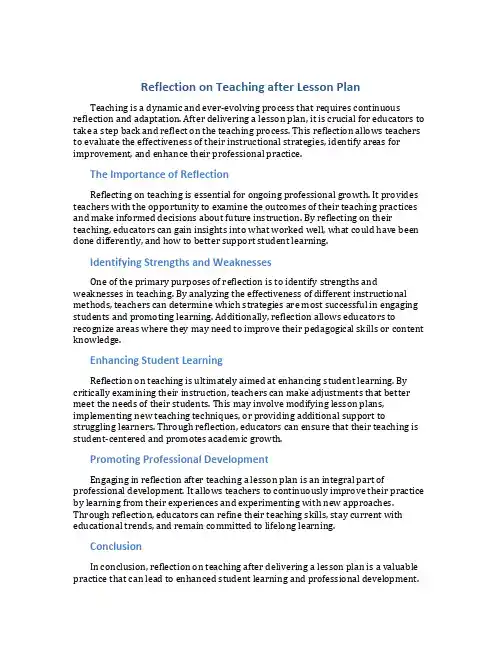
Reflection on Teaching after Lesson Plan Teaching is a dynamic and ever-evolving process that requires continuous reflection and adaptation. After delivering a lesson plan, it is crucial for educators to take a step back and reflect on the teaching process. This reflection allows teachers to evaluate the effectiveness of their instructional strategies, identify areas for improvement, and enhance their professional practice.The Importance of ReflectionReflecting on teaching is essential for ongoing professional growth. It provides teachers with the opportunity to examine the outcomes of their teaching practices and make informed decisions about future instruction. By reflecting on their teaching, educators can gain insights into what worked well, what could have been done differently, and how to better support student learning.Identifying Strengths and WeaknessesOne of the primary purposes of reflection is to identify strengths and weaknesses in teaching. By analyzing the effectiveness of different instructional methods, teachers can determine which strategies are most successful in engaging students and promoting learning. Additionally, reflection allows educators to recognize areas where they may need to improve their pedagogical skills or content knowledge.Enhancing Student LearningReflection on teaching is ultimately aimed at enhancing student learning. By critically examining their instruction, teachers can make adjustments that better meet the needs of their students. This may involve modifying lesson plans, implementing new teaching techniques, or providing additional support to struggling learners. Through reflection, educators can ensure that their teaching is student-centered and promotes academic growth.Promoting Professional DevelopmentEngaging in reflection after teaching a lesson plan is an integral part of professional development. It allows teachers to continuously improve their practice by learning from their experiences and experimenting with new approaches. Through reflection, educators can refine their teaching skills, stay current with educational trends, and remain committed to lifelong learning.ConclusionIn conclusion, reflection on teaching after delivering a lesson plan is a valuable practice that can lead to enhanced student learning and professional development.By taking the time to reflect on their instructional practices, teachers can identify areas for improvement, build on their strengths, and ultimately become more effective educators. Continued reflection is essential for ensuring that teachers are responsive to the needs of their students and committed to delivering high-quality instruction.。
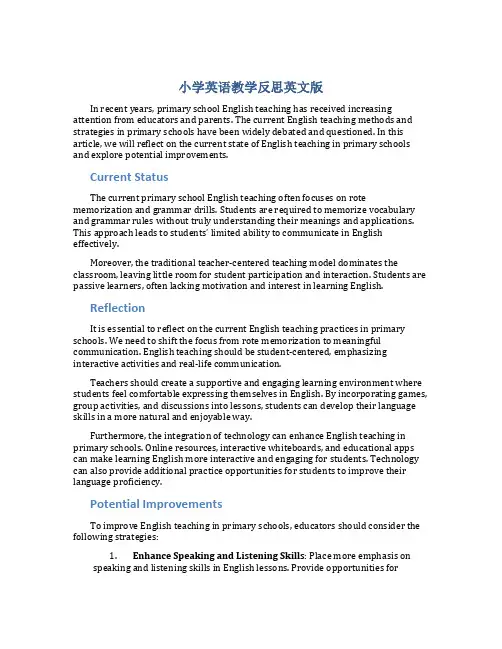
小学英语教学反思英文版In recent years, primary school English teaching has received increasing attention from educators and parents. The current English teaching methods and strategies in primary schools have been widely debated and questioned. In this article, we will reflect on the current state of English teaching in primary schools and explore potential improvements.Current StatusThe current primary school English teaching often focuses on rote memorization and grammar drills. Students are required to memorize vocabulary and grammar rules without truly understanding their meanings and applications. This approach leads to students’ limited ability to communicate in English effectively.Moreover, the traditional teacher-centered teaching model dominates the classroom, leaving little room for student participation and interaction. Students are passive learners, often lacking motivation and interest in learning English.ReflectionIt is essential to reflect on the current English teaching practices in primary schools. We need to shift the focus from rote memorization to meaningful communication. English teaching should be student-centered, emphasizing interactive activities and real-life communication.Teachers should create a supportive and engaging learning environment where students feel comfortable expressing themselves in English. By incorporating games, group activities, and discussions into lessons, students can develop their language skills in a more natural and enjoyable way.Furthermore, the integration of technology can enhance English teaching in primary schools. Online resources, interactive whiteboards, and educational apps can make learning English more interactive and engaging for students. Technology can also provide additional practice opportunities for students to improve their language proficiency.Potential ImprovementsTo improve English teaching in primary schools, educators should consider the following strategies:1.Enhance Speaking and Listening Skills: Place more emphasis onspeaking and listening skills in English lessons. Provide opportunities forstudents to practice speaking English through role-plays, conversations, andpresentations.2.Encourage Active Participation: Encourage student participationthrough interactive activities, group work, and projects. Create a student-centered learning environment that fosters creativity and collaboration.e of Authentic Materials: Incorporate authentic materials such assongs, videos, and stories into English lessons. Authentic materials can makelearning English mo re engaging and relevant to students’ daily lives.4.Provide Feedback and Support: Offer constructive feedback tostudents on their language usage and provide support when needed. Encourage students to take risks and make mistakes as part of the learning process.By implementing these strategies, we can help improve the quality of English teaching in primary schools and equip students with the necessary language skills to succeed in an increasingly globalized world.In conclusion, the current state of English teaching in primary schools requires reflection and improvement. By adopting student-centered approaches, integrating technology, and emphasizing communication skills, we can create a more effective and engaging learning environment for students to develop their English proficiency.。
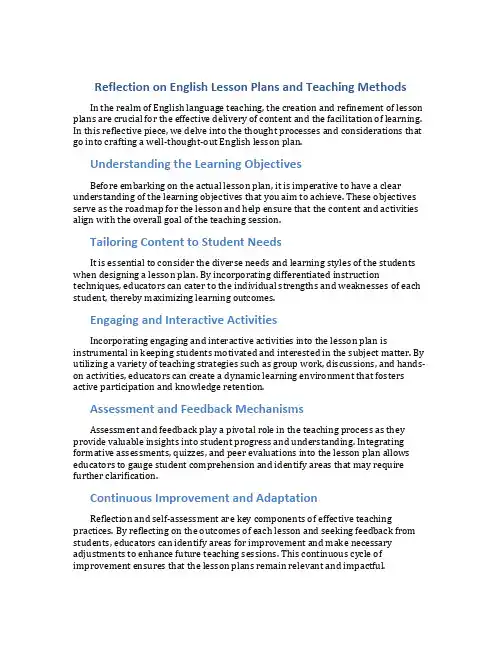
Reflection on English Lesson Plans and Teaching Methods In the realm of English language teaching, the creation and refinement of lesson plans are crucial for the effective delivery of content and the facilitation of learning. In this reflective piece, we delve into the thought processes and considerations that go into crafting a well-thought-out English lesson plan.Understanding the Learning ObjectivesBefore embarking on the actual lesson plan, it is imperative to have a clear understanding of the learning objectives that you aim to achieve. These objectives serve as the roadmap for the lesson and help ensure that the content and activities align with the overall goal of the teaching session.Tailoring Content to Student NeedsIt is essential to consider the diverse needs and learning styles of the students when designing a lesson plan. By incorporating differentiated instruction techniques, educators can cater to the individual strengths and weaknesses of each student, thereby maximizing learning outcomes.Engaging and Interactive ActivitiesIncorporating engaging and interactive activities into the lesson plan is instrumental in keeping students motivated and interested in the subject matter. By utilizing a variety of teaching strategies such as group work, discussions, and hands-on activities, educators can create a dynamic learning environment that fosters active participation and knowledge retention.Assessment and Feedback MechanismsAssessment and feedback play a pivotal role in the teaching process as they provide valuable insights into student progress and understanding. Integrating formative assessments, quizzes, and peer evaluations into the lesson plan allows educators to gauge student comprehension and identify areas that may require further clarification.Continuous Improvement and AdaptationReflection and self-assessment are key components of effective teaching practices. By reflecting on the outcomes of each lesson and seeking feedback from students, educators can identify areas for improvement and make necessary adjustments to enhance future teaching sessions. This continuous cycle of improvement ensures that the lesson plans remain relevant and impactful.ConclusionIn conclusion, the creation of an effective English lesson plan requires careful consideration of the learning objectives, student needs, engagement strategies, assessment methods, and feedback mechanisms. By adhering to these principles and engaging in a process of continuous reflection and adaptation, educators can enhance the quality of their teaching practices and create an enriching learning experience for their students.Remember to always proofread before finalizing the lesson plan to ensure accuracy and clarity.。
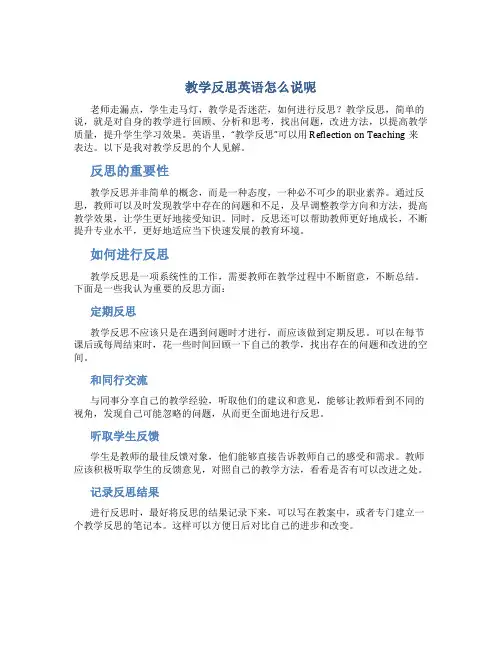
教学反思英语怎么说呢老师走漏点,学生走马灯,教学是否迷茫,如何进行反思?教学反思,简单的说,就是对自身的教学进行回顾、分析和思考,找出问题,改进方法,以提高教学质量,提升学生学习效果。
英语里,“教学反思”可以用Reflection on Teaching来表达。
以下是我对教学反思的个人见解。
反思的重要性教学反思并非简单的概念,而是一种态度,一种必不可少的职业素养。
通过反思,教师可以及时发现教学中存在的问题和不足,及早调整教学方向和方法,提高教学效果,让学生更好地接受知识。
同时,反思还可以帮助教师更好地成长,不断提升专业水平,更好地适应当下快速发展的教育环境。
如何进行反思教学反思是一项系统性的工作,需要教师在教学过程中不断留意,不断总结。
下面是一些我认为重要的反思方面:定期反思教学反思不应该只是在遇到问题时才进行,而应该做到定期反思。
可以在每节课后或每周结束时,花一些时间回顾一下自己的教学,找出存在的问题和改进的空间。
和同行交流与同事分享自己的教学经验,听取他们的建议和意见,能够让教师看到不同的视角,发现自己可能忽略的问题,从而更全面地进行反思。
听取学生反馈学生是教师的最佳反馈对象,他们能够直接告诉教师自己的感受和需求。
教师应该积极听取学生的反馈意见,对照自己的教学方法,看看是否有可以改进之处。
记录反思结果进行反思时,最好将反思的结果记录下来,可以写在教案中,或者专门建立一个教学反思的笔记本。
这样可以方便日后对比自己的进步和改变。
结语教学反思是每位教师应该具备的素质,只有不断地反思自己的教学才能进步、优化教学,为学生提供更好的教育服务。
希望每位教师都能重视教学反思,让自己的教学更上一层楼。
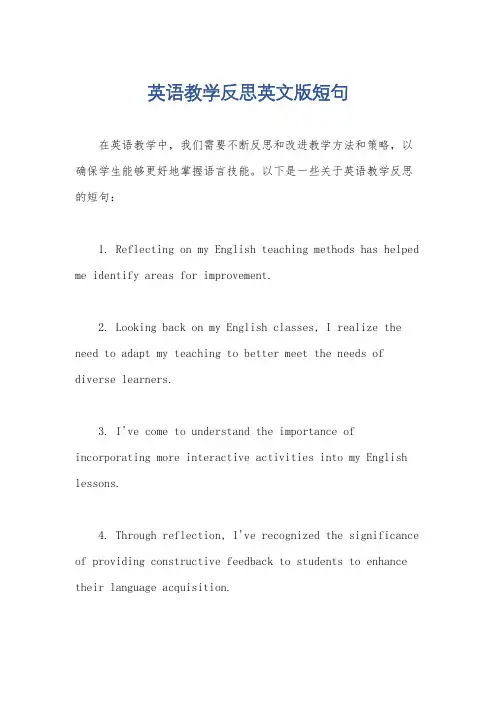
英语教学反思英文版短句在英语教学中,我们需要不断反思和改进教学方法和策略,以确保学生能够更好地掌握语言技能。
以下是一些关于英语教学反思的短句:1. Reflecting on my English teaching methods has helped me identify areas for improvement.2. Looking back on my English classes, I realize the need to adapt my teaching to better meet the needs of diverse learners.3. I've come to understand the importance of incorporating more interactive activities into my English lessons.4. Through reflection, I've recognized the significance of providing constructive feedback to students to enhance their language acquisition.5. Engaging in self-reflection has allowed me to refine my approach to teaching English grammar and vocabulary.6. I am constantly reevaluating my English teaching strategies to foster a more inclusive and supportive learning environment.7. Reflecting on student performance has prompted me to explore new ways of scaffolding English language skills.这些短句涵盖了英语教学反思的各个方面,包括教学方法、学生需求、互动活动、反馈、语法和词汇教学、学习环境和学生表现等。
英语教案每日教学反思英文版IntroductionTeaching English as a second language is a challenging yet rewarding endeavor. Each day brings new opportunities for growth and improvement in our teaching practice. This reflective document aims to analyze the daily teaching experiences, evaluate the effectiveness of lesson plans, and identify areas for further development in English language instruction.Daily Teaching Reflection1.Lesson Objectives: Were the learning objectives clearly outlined atthe beginning of the lesson? Did the students understand what they wereexpected to achieve by the end of the session?2.Engagement: How engaged were the students during the lesson?Were they actively participating in classroom activities and discussions?3.Instructional Strategies: Did the chosen instructional methodseffectively facilitate student learning? Were there any strategies that worked particularly well or fell short of expectations?4.Assessment: How did I assess student learning during the lesson?Were the assessment methods appropriate for measuring student progress and understanding?5.Feedback: What feedback did I provide to students during the lesson?How was this feedback received, and how can it be improved in future lessons?Evaluating Lesson Plans1.Alignment: How well did the lesson plan align with the overallcurriculum objectives and standards? Were there any components that needed to be revised for better alignment?2.Differentiation: Did the lesson plan cater to the diverse learningneeds of all students in the classroom? Were there opportunities fordifferentiation to support individual student growth?3.Engagement: Did the lesson plan incorporate engaging activities thatmotivated students to participate and learn? Were there opportunities forstudent collaboration and interaction?4.Assessment: How did the assessment methods in the lesson planmeasure student progress and understanding? Were there opportunities for formative assessment to monitor student learning throughout the lesson?5.Reflection: After teaching the lesson, what modifications would Imake to the lesson plan for future implementation? How can the lesson plan be improved to enhance student learning outcomes?Areas for Development1.Student Engagement: How can I further enhance studentengagement in the classroom to promote active learning and participation?2.Differentiation: What strategies can be implemented to betterdifferentiate instruction and support the diverse learning needs of students?3.Feedback: How can I improve the feedback provided to students topromote a growth mindset and continuous improvement in their Englishlanguage skills?4.Professional Development: What professional developmentopportunities can I pursue to enhance my English language teaching skills and knowledge?5.Collaboration: How can I collaborate with colleagues to share bestpractices, resources, and strategies for effective English language instruction?ConclusionReflecting on daily teaching experiences and evaluating lesson plans are essential components of professional growth and development as an English language instructor. By continuously assessing our teaching practice and seeking opportunities for improvement, we can create a more engaging and effective learning environment for our students. Through ongoing reflection and self-assessment, we can strive to be lifelong learners and dedicated educators in the field of English language instruction.This document serves as a reflection on daily English language teaching practices and aims to enhance teaching effectiveness through self-assessment and continuous improvement.。
九年级英语教学后记通用范文全文共3篇示例,供读者参考篇1Reflection on Ninth Grade English TeachingAs the school year comes to an end, it is time to reflect on my experience of teaching ninth grade English. This year has been both challenging and rewarding, as I have watched my students grow and develop their language skills.One of the highlights of this year was seeing my students become more confident in their ability to communicate in English. Many of them started the year feeling hesitant and unsure, but through consistent practice and encouragement, they have made significant progress. I have seen their vocabulary expand, their pronunciation improve, and their writing become more sophisticated.I have also focused on creating a positive and encouraging classroom environment, where students feel comfortable taking risks and making mistakes. It is important for teenagers to feel supported and valued, especially when they are learning a new language. By praising their efforts and providing constructivefeedback, I have seen my students become more willing to participate and engage in class activities.In terms of curriculum, I have tried to make the material relevant and engaging for my students. We have explored a variety of topics, from literature to current events, in order to expose them to different styles of writing and foster critical thinking skills. I have also integrated technology into my lessons, using multimedia resources and online tools to make learning more interactive and dynamic.One area that I will continue to focus on in the future is differentiation. It is important to recognize that every student learns differently and has unique strengths and weaknesses. By tailoring my lessons to accommodate different learning styles and abilities, I can ensure that all of my students are challenged and supported in their language development.Overall, teaching ninth grade English has been a gratifying experience. I have learned a great deal from my students and colleagues, and I am excited to continue growing as an educator in the years to come. I am grateful for the opportunity to work with such a talented and motivated group of young learners, and I am confident that they will achieve great things in the future.篇2After nine years of teaching English to ninth graders, I can confidently say that it has been a challenging but rewarding experience. Throughout the years, I have had the opportunity to witness my students grow and improve their language skills, and I am proud of the progress they have made.One of the key strategies I have used in my teaching is to create a supportive and stimulating learning environment. I believe that when students feel valued and comfortable in the classroom, they are more likely to engage with the material and take risks in their language learning. To achieve this, I have implemented a variety of activities and exercises that cater to different learning styles and abilities. For example, I often incorporate group work, pair discussions, and games into my lessons to keep students engaged and motivated.In addition to creating a positive classroom atmosphere, I have also focused on providing meaningful and relevant content for my students. I believe that when students see the real-world applications of the language they are learning, they are more likely to be motivated to learn and improve. To achieve this, I have incorporated topics that are relevant to teenagers, such as social media, technology, and current events, into my lessons.This has not only made the material more engaging for students, but has also helped them see the practical benefits of learning English.Another important aspect of my teaching is providing regular feedback to my students. I believe that constructive feedback is essential for students to understand their strengths and weaknesses and to improve their skills. To this end, I have implemented a variety of assessment methods, such as quizzes, tests, and presentations, to gauge my students' progress and provide them with feedback on their performance. I also encourage students to self-assess their work and set goals for improvement, which helps them take ownership of their learning.Overall, teaching ninth graders English has been a fulfilling experience for me. I have enjoyed seeing my students grow and develop their language skills, and I am proud of the progress they have made. By creating a supportive learning environment, providing meaningful content, and offering regular feedback to my students, I have been able to help them improve their English skills and become more confident language learners. I look forward to continuing to teach and inspire my students in the years to come.篇3After teaching ninth grade English for a full academic year, I have had the opportunity to reflect on the successes and challenges of my teaching practice. This year has been a rewarding experience, as I have witnessed my students grow and develop their English language skills. In this reflection, I will discuss some of the key lessons I have learned from teaching ninth grade English.First and foremost, I have learned the importance of building a strong classroom community. In order to create a positive and productive learning environment, it is essential to establish a sense of trust and respect among students. I have worked hard to foster a supportive atmosphere in my classroom where students feel comfortable taking risks and making mistakes. By encouraging collaboration and peer feedback, I have seen my students become more confident in their abilities and more willing to engage with challenging material.Another key lesson I have learned is the importance of differentiation in instruction. Every student comes to the classroom with their own unique strengths and weaknesses, and it is essential to tailor instruction to meet the needs of each individual learner. I have used a variety of instructional strategies,such as small group work, project-based learning, and multimedia resources, to engage students with different learning styles and abilities. By incorporating a range of activities and assessments, I have been able to support my students in mastering the English language skills they need to succeed.Additionally, I have discovered the value of formative assessment in guiding instruction and improving student learning. Throughout the year, I have regularly used quizzes, exit tickets, and informal checks for understanding to gauge student progress and identify areas for growth. By providing timely feedback and opportunities for revision, I have helped my students take ownership of their learning and make meaningful improvements. I have also used data from formative assessments to adjust my instructional practices and better meet the needs of my students.Finally, I have learned the importance of fostering a growth mindset in my students. I have encouraged my ninth graders to embrace challenges and view mistakes as opportunities for learning and growth. By praising effort and perseverance, rather than innate ability, I have helped my students develop resilience and grit in the face of academic struggles. I have also encouraged students to set realistic goals for themselves andtake ownership of their learning journey. By instilling a growth mindset in my students, I have witnessed them become more motivated, engaged, and confident in their abilities.In conclusion, teaching ninth grade English has been a challenging yet rewarding experience. I have learned valuable lessons about the importance of building a strong classroom community, differentiating instruction, using formative assessment, and fostering a growth mindset in my students. As I continue to grow and develop as an educator, I will carry these lessons with me and strive to create a learning environment where all students can thrive and succeed in their English language learning journey.。
Teaching reflectionBefore I studied this course and stepped into the platform to experience what is a real teacher, I always think teaching is an easing thing. The teacher just needs to copy the teaching content from the teaching reference books and show them to the students. However, through this course I feel all the things changed completely. No matter from the preparation to the practice, from my teaching plan to my PPT, or from my rehearsal to my real show; they all let me have an entirely different attitude towards English teaching.Through a semester’s leaning, teaching and thinking, I have some opinions or also called teaching reflection towards English teaching, which includes the aspects of the teacher, the students, the teaching methods, the class activities, the textbook and also about the teaching reflection itself. All of these thinking, I consider, will do a great favor to my teaching career.Firstly, I’d like to say the teaching reflection itself. It is very essential for teachers to carry on it in time after class, which can let the teacher to think about the process and have a clear analysis of this class. Through this procedure, the teacher can find the shortcomings of this class, have a deep thinking of the issues and later find the solutions for them, which can form a good circulation in the teaching process that benefit both the students and the teacher. In teaching practice, we went to the mini-class several times. After each teaching, I would study my teaching video to find my good points and my class’s shortcomings, which can as my reference to modify my teaching content or to find more proper ways in the next class. By using this way I learned a lot about how to transform the knowledge from my textbook to the reality class teaching.Secondly, the class activities should be used properly. About this point, I’m deeply affected by it. When first writing my teaching plans, I am always trying to add more activities like chant, game, song and so on, which I think will increase the interesting of the class. But when I really carry on the class as my plan, the result make me fell upset. So many activities not only let class sometimes out of control, but also make the class remains with form instead of real content. I think not only me but also others face this problem when we first begin to teaching. By the help of my teacher and the later practices, I realized that the class activities are not the purpose of our class; however, it is only one way in our teaching process. Proper quantity and quality class activities will activate our teaching, but abusing use of them will make our teaching go to formalism. So when choosing the activities, it is essential to consider out teaching purpose and the content of the lesson first. That let the activities serve for our teaching is our original goal.Thirdly, the using of the teaching methods in the real class should be varied. In the teaching theory class we learned different teaching methods like grammar-translation method, direct method, total physical response, situational language teaching and so on. But in practical use, it is hardly to find using only one method in one teaching period. Even in the 45mins’ class, we have different steps like lead-in, presentation, practice, consolidation and other flexible parts. According to the purposes and the characteristics of different part, we should take in different teaching method. For example, in the beginning of the class we can create a situation by using the method of situation language teaching to attract our students’ attention. When we carry on class activities, we can employ the method of total physical response to deepen the impression of the language on the mind of students. So in the practical teaching, the teacher should consider the flexibility in using these teaching methods. And I think no method is totally good or bad. If we can find the right place for each of them, they are all good for our teaching.The fourthly I want to mention is the using the textbook. It is the basic factor in our teachingfor we go on our lesson, according to which we decide our teaching process, teaching content, teaching objectives and almost all the related things. But it is only the basis and we need beyond it. In the premise of full respect of it, we should try to beyond and break through the textbook instead of limited by it. Our textbooks process flexibility, which requires our teacher to use them creatively according to our teaching curriculums. The textbook should be our basis and the life should be our content, which will guarantee our students learn as possible as many things.The last but not the least is our students and the teachers. In the spirit of our new curriculum, the students are our core in the English teaching and the teachers’ roles should change from the controller to the assessor, organizer, promoter, participant, resource-provider, guides and others. We should put more emphasis on the autonomy of our students. Let them be the main body of our class and through cooperating and group learning; let the interests be their learning motivations for long time study. As the teacher under the continuous teaching reform and new curriculum, we should keep study all the time. In spite of promoting our professional knowledge, the enthusiasm for the teaching career, the love for our students, the pursuit and the explore of the new teaching concept and the more summarizing and reflection of our teaching are also the necessary things we should always do.All of the above are my teaching reflections through this course’s studying. Maybe some of them are still superficial or even wrong to some extent, but I will go on my teaching with the process of learning and thinking.。
Reflection on English teaching对英语教学的反思
Practice has proved that traditional teaching, by explaining and practice of mechanical Way
to Learn vocabulary is not. Out of Touch especially in the current primary and secondary English
language, vocabulary, and teaching mission of the situation, we should pay attention to cultivating
students' self-learning ability.
Teach word, requiring teachers to their own demonstration in place, enunciate clearly explain
the key points of pronunciation. The cultivation of students' listening at the same time, keep your
eyes on, positive habit of imitating.After the hearing to say. Determine most of the students hear
you, imitate correct, and then show their cards, so as not to distract the attention of students. On
body language in an intuitive word with a picture, helping students to understand.Successful
completion of excessive ----- Step by step.
Word is one of the three elements of the language. Working of the human mind is the use of
the word. Exchange of the human mind is achieved through a sentence composed of words.No
words of any language is unthinkable. Therefore the word with the meaning of language, should
be out in the context of a specific, so both for students to understand, was also impressive.
In teaching, we should advocate the " New old through " or " mutual migration ". In fact, this
is also a good way to learn. Such as : pen----pencil-----pencil-box,
day----today----monday----tuesday----yesterday, all---tall---ball----small, and so on.
Britain's famous language C. E eckersley said : " The best way to teach English is the way to
arouse students' interest in learning English." We can't just let the students in the teaching of the
word memorization, and should try to use a variety of forms specially in mind. Such as the use of
children's songs, puzzles, primitive forms.
Learning is designed to use of the word vocabulary, and to correctly use of written expression.
Creating a certain level of language in English teaching scenarios, so that students like in an
authentic language environment, you can make your students' natural learning vocabulary to
express their thoughts and feelings, so as to achieve effects to learn and use.Such as : the teaching
of the seven grade book unit 3, we can allow students to take the whole family to come to the
school, family allow students to introduce themselves to each other, so that students master in the
use of the word and sentence.
Let the students for a specific action to implement specific language learning purposes, by
completing specific communicative tasks to acquire and accumulate the appropriate learning
experiences.Design of a task that is to provide students with a clear, authentic language
information so that students in a natural, real or simulated experience of language in real situations,
language applications.